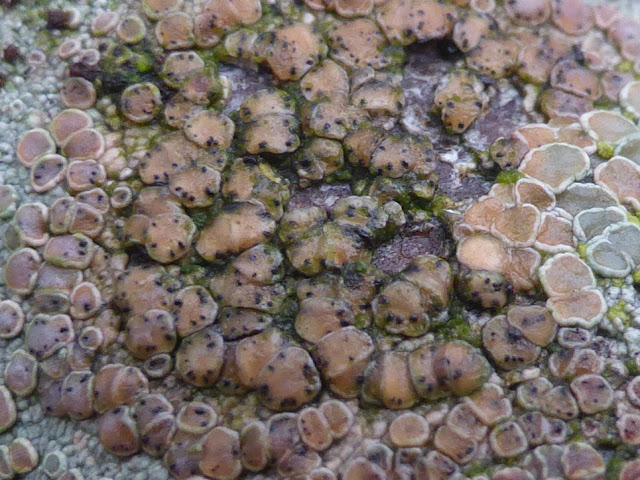2020:02:02 is Palindrome day
Come with us on this special day on a moist morning walk round the grounds of Arniston House 12m south of Edinburgh searching, under the shelter of the green and white Edinburgh Botanic Garden umbrella, for ..... lichens.

... for new records to add to our lists..
... for new species we have not seen before ..
... for intricate shapes and colours seen only through the magic of a hand lens.
Who are we?
We are the tail-end of the British Lichen Society (BLS) whose AGM was held in Edinburgh (Royal botanic Gardens Edinburg - RGBE) the previous two days 31 Jan - 1 Feb
.. The tail-end .. or maybe the cream!
Amongst our group are some of Britain's best and keenest lichenologists. There are also relative newbies - and others in between. From one young lady studying art and lichen to another carrying out a PhD in lichen genetics, to two ladies from the local natural history club. From lichen surveyors to writers of the British Lichen Flora. (Actually they can be the same people)
As you look through these pictures you will see some maps from the BLS website: Thank you BLS. Our results will be sent in to add to these maps.
 |
My first new species for the day: and on one of the first trees, a sycamore: Bacidia rubella
|
seen
just... here.
just... here.
My next "new" lichen is one I have seen twice before
.. but NOW it has a new name!!
Old name: Schismatomma decolorans
 |
It scratches orange because it contains Trentepohlia. (See the scratches) I have seen this before at Carlisle BLS and at Juniper Hall autumn BLS meeting - so you'd think I would have learned to recognise it by now! It has changed its name. To Dendrographa decolorans |
 |
| This is the top of an old fence post. The blacky green gunge is Trapeliopsis flexuosa |
 | |
|
On a Hazel branch (I think) we find:
 |
| Physcia aipola - (the black apothecia) |
On a beech branch there is
 |
| Lecanora chlarotera with a parasite - probably Vouauxiella_lichenicola |
 |
| Lecanora chlarotera with a parasite - probably Vouauxiella lichenicola |
A nearby beech tree has this lichen and then we found it on several other trees:
 |
| Pyrrhospora quernea |
 |
| Pyrrhospora quernea on Beech |
 |
| Bactrospora corticola |
(formerly Lecanactis corticola) This grows in dry cracks in trunks of old oak trees.
 |
| At the local Co-0p in Edinburgh the previous evening I have been assured that macaroni cheese pie is a popular Scottish Meal. Now was my chance to try it. Yes, I will buy it again. |
 |
| Snowdrops |
As we descend towards the stream in the valley bottom, several trees have a profusion of Evernia prunastri and other foliose lichens. Is this because it is more humid, or because it is sheltered from polluting winds, or is there a particularly vigorous clone of Evernia growing on these three or four trees (including one conifer). (There is some Usnea sp and Ramalina spp too)
 |
| A lady and I find this splendid Cladonia on a mossy stump near the ground. All Neil will say is "Pixie cups!" |
 | ||
| Here is some fruiting Usnea subfloridana on a branch near the stream |
Lower down the branch is this Pertusaria..
species?
A study is made of the Porina on the bark above and shown close up below.
Probably Porina aenia
 |
| And on a trunk on an oak tree near the stream some Lecanactis abietinum in fruit (It does not often fruit) |
 |
| We find some striking Earth Stars
As we return towards the house I take another picture of the Bacidia rubella
 Rebecca tells me she has found some Caloplaca ulcerosa on some trunks, but there is not time to go back and look. perhaps she will send me a photo. Finally we return to Arniston House to await the taxi driver to take us back to Edinbugh, just as the rain starts to set in. |
My records show that I have seen 40 species of Lichen today (not all listed in this blog).
I wonder what the official total will be?
The above photos were taken with my Pansonic TZ40 (since I left my Olympus TG4 at home)
------------------------
.. below just a few notes on the BLS AGM meeting..
On the afternoon of 31st Jan we held a committee meeting. At 5pm we had a poster exhibition. There were displays by several artists.
There is an exhibition starting at the Gardens: Then we had a lecture by Prof. Peter Crittenden, who is retiring this year as Editor in Chief of the Lichenologist, on "Toughing it out: lichen ecology and a life in lichen research".
We held the AGM on Saturday morning. In the afternoon there were talks.
I worked out over the weekend I had met 60 people, and wrote down the names of some of them to attempt to learn them. (Which is harder, Lichen names or People names?)
In the evening I went to stay with a friend who works for a forestry organisation. We went for a walk to the nearby Co-op and bought my lunch for the following day- A macaroni pie.
Sunday dawned. Moist. I travelled by bus, successfully following my Smartphone, from her house to the Royal Botanic Gardens where I met the others. Six of us shared a taxi to Arniston House, a country house 12 miles south of Edinburgh on the River South Esk, near Gorebridge... Continue at the top of the page.

















No comments:
Post a Comment